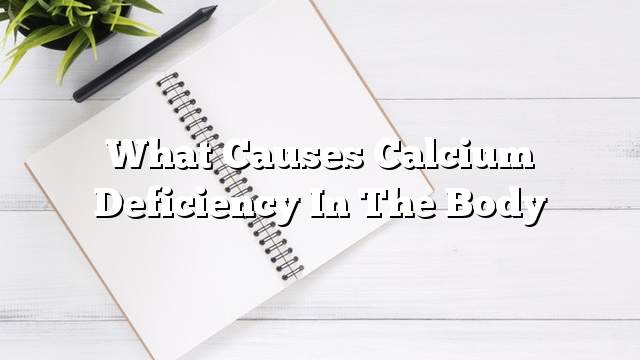Calcium
Calcium is one of the most important minerals needed by the body. It is very important for the health and safety of bones and teeth as well as its importance in the prevention of cardiovascular disease, and also for the prevention of some chronic diseases and the prevention of kidney stones and other benefits.
Calcium Sources
Calcium is obtained from food such as milk, dairy products, vegetables, etc., and can be obtained through dietary supplements in pharmacies. Calcium deficiency is a serious problem as it leads to osteoporosis and thus increases the chance of fractures.
Causes of calcium deficiency
As for the reasons for lack of calcium in the body is multiple, including what is linked to the nature of food obtained by the human, and what is related to a particular disease, and what is the result of aging. Here are some of the reasons that lead to calcium deficiency:
- Not getting enough calcium from food, which is one of the main reasons for calcium deficiency, so it is necessary to eat the sources of calcium metal from milk and its derivatives and others.
- Vitamin D deficiency. It has been found that many people are suffering from this problem, because vitamin D has returned from its other benefits is very important to absorb calcium. We often hear that we suffer from osteoporosis, although it is a very common source of calcium, as a result of the body’s inability to absorb calcium due to vitamin D deficiency.
- Magnesium deficiency and phosphorus. As with vitamin D, magnesium and phosphorus help absorb calcium, and their decrease reduces the ability of the body to absorb it.
Other causes of calcium deficiency
- Menopause and age increase. The issue of calcium deficiency with age is common for males and females. In general, the ability of the body to absorb as age increases. As for menopause and menstruation, estrogen helps diaper levels within the bone, so after menstruation the estrogen levels in women are reduced, making them more susceptible to osteoporosis.
- Pregnancy and lactation In pregnancy and lactation, vitamins and minerals taken by the mother pass on to her child, including calcium, and thus lead to calcium deficiency. As the age increases and the risk of calcium deficiency increases, this leads to osteoporosis. Therefore, doctors resort to giving the pregnant woman essential vitamins and minerals such as calcium, for the fetus and for health, and supplement this during the infancy.
- Some health problems and medicines may lead to calcium deficiency. Some of these problems include: breast cancer, prostate cancer, pancreatitis, thyroid dysfunction, renal failure, and some medications that affect calcium: some types of diuretics and chemotherapy drugs.
